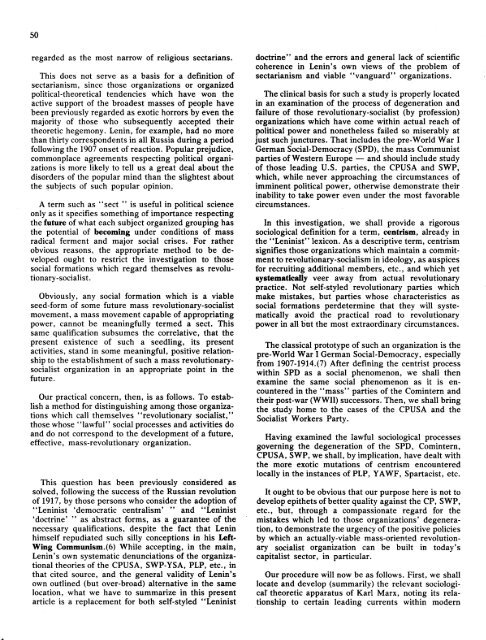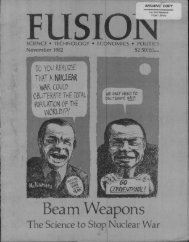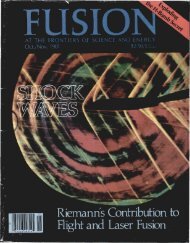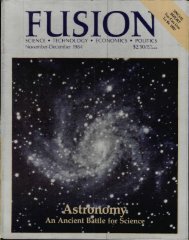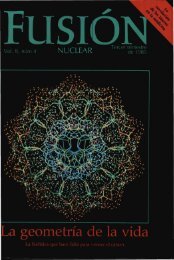New Left, Local Control, and Fascism
New Left, Local Control, and Fascism
New Left, Local Control, and Fascism
Create successful ePaper yourself
Turn your PDF publications into a flip-book with our unique Google optimized e-Paper software.
50<br />
regarded as the most narrow of religious sectarians, doctrine" <strong>and</strong> the errors <strong>and</strong> general lack of scientific<br />
coherence in Lenin's own views of the problem of<br />
This does not serve as a basis for a definition of sectarianism <strong>and</strong> viable "vanguard" organizations.<br />
sectarianism, since those organizations or organized<br />
political-theoretical tendencies which have won the The clinical basis for such a study is properly located<br />
active support of the broadest masses of people have in an examination of the process of degeneration <strong>and</strong><br />
been previously regarded as exotic horrors by even the failure of those revolutionary-socialist (by profession)<br />
majority of those who subsequently accepted their organizations which have come within actual reach of<br />
theoretic hegemony. Lenin, for example, had no more political power <strong>and</strong> nonetheless failed so miserably at<br />
than thirty correspondents in all Russia during a period just such junctures. That includes the pre-World War I<br />
following the 1907 onset of reaction. Popular prejudice, German Social-Democracy (SPD), the mass Communist<br />
commonplace agreements respecting political organi- parties of Western Europe -- <strong>and</strong> should include study<br />
zations is more likely to tell us a great deal about the of those leading U.S. parties, the CPUSA <strong>and</strong> SWP,<br />
disorders of the popular mind than the slightest about which, while never approaching the circumstances of<br />
the subjects of such popular opinion, imminent political power, otherwise demonstrate their<br />
inability to take power even under the most favorable<br />
A term such as "sect " is useful in political science circumstances.<br />
only as it specifies something of importance respecting<br />
the future of what each subject organized grouping has In this investigation, we shall provide a rigorous<br />
the potential of becoming under conditions of mass sociological definition for a term, centrism, already in<br />
radical ferment <strong>and</strong> major social crises. For rather the "Leninist" lexicon. As a descriptive term, centrism<br />
obvious reasons, the appropriate method to be de- signifies those organizations which maintain a commitveloped<br />
ought to restrict the investigation to those mentto revolutionary-socialism in ideology, as auspices<br />
social formations which regard themselves as revolu- for recruiting additional members, etc., <strong>and</strong> which yet<br />
tionary-socialist, systematically veer away from actual revolutionary<br />
practice. Not self-styled revolutionary parties which<br />
Obviously, any social formation which is a viable make mistakes, but parties whose characteristics as<br />
seed-form of some future mass revolutionary-socialist social formations perdetermine that they will systemovement,<br />
a mass movement capable of appropriating matically avoid the practical road to revolutionary<br />
power, cannot be meaningfully termed a sect. This power in all l_ut the most extraordinary circumstances.<br />
same qualification subsumes the correlative, that the<br />
present existence of such a seedling, its present The classical prototype of such an organization is the<br />
activities, st<strong>and</strong> in some meaningful, positive relation- pre-World War I German Social-Democracy, especially<br />
ship to the establishment of such a mass revolutionary- from 1907-1914.(7) After defining the centrist process<br />
socialist organization in an appropriate point in the within SPD as a social phenomenon, we shall then<br />
future, examine the same social phenomenon as it is encountered<br />
in the "mass" parties of the Comintern <strong>and</strong><br />
Our practical concern, then, is as follows. To estab- their post-war (WWII) successors. Then, we shall bring<br />
lish a method for distinguishing among those organiza- the study home to the cases of the CPUSA <strong>and</strong> the<br />
tions which call themselves "revolutionary socialist," Socialist Workers Party.<br />
those whose "lawful" social processes <strong>and</strong> activities do<br />
<strong>and</strong> do not correspond to the development of a future, Having examined the lawful sociological processes<br />
effective, mass-revolutionary organization, governing the degeneration of the SPD, Comintern,<br />
CPUSA, SWP, we shall, by implication, have dealt with<br />
the more exotic mutations of centrism encountered<br />
locally in the instances of PLP, YAWF, Spartacist, etc.<br />
This question has been previously considered as<br />
solved, following the success of the Russian revolution It ought to be obvious that our purpose here is not to<br />
of 1917, by those persons who consider the adoption of develop epithets of better quality against the CP, SWP,<br />
"Leninist 'democratic centralism' " <strong>and</strong> "Leninist etc., but, through a compassionate regard for the<br />
'doctrine' " as abstract forms, as a guarantee of the mistakes which led to those organizations' degeneranecessary<br />
qualifications, despite the fact that Lenin tion, to demonstrate the urgency of the positive policies<br />
himself repudiated such silly conceptions in his <strong>Left</strong>- by which an actually-viable mass-oriented revolution-<br />
Wing Communism.(6) While accepting, in the main, ary socialist organization can be built in today's<br />
Lenin's own systematic denunciations of the organiza- capitalist sector, in particular.<br />
tional theories of the CPUSA, SWP-YSA, PLP, etc., in<br />
that cited source, <strong>and</strong> the general validity of Lenin's Our procedure will now be as follows. First, we shall<br />
own outlined (but over-broad) alternative in the same locate <strong>and</strong> develop (summarily) the relevant sociologilocation,<br />
what we have to summarize in this present cal' theoretic apparatus of Karl Marx, noting its relaarticle<br />
is a replacement for both self-styled "Leninist tionship to certain leading currents within modern


